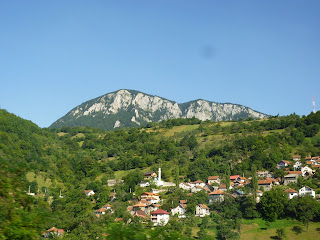I really don't need books or anything for day-time travel in the Balkans - the view from the bus windows is nearly always worth trying to get a glance at it, even when everyone else rather closes the curtains against the sun. Coming from Northern Germany and having spent my childhood vacations at the North Sea I've never been much of a mountain person, but the Balkans actually intrigue me, wild and green with many turquoise rivers deep down in steep valleys cut into the stone. The way from Mostar to Sarajevo offers many spectacular views and numerous European villages each with a small mosque. So, what is this discussion if Islam belongs to Europe about anyway?
There is a four hours lay-over in Sarajevo, I am tired and spend it in the hall of the central bus station, reading. The room looks strangely fallen out of time, 1970s' architecture including dark wood panels, some abstract wall decoration and the Sarajevo '84 snowflake (emblem of the winter Olympics) and script prominently placed over the central clock. I am a bit worried about the night bus, but it turns out to be quite a family trip. And both Serbian and Kosovar border officials accept my ID card for crossing the border, so, no stamps, no trouble. After collecting the documents and taking them to their office for some time, the border policeman hands them back to the conductor who then calls out the passengers' names, always interesting if they call the foreigners by first or last name and if the English native speakers recognize themselves. I usually get some special German greeting...
After two borders and changing the bus during the night I am not exactly awake when I reach Prishtine at eight in the morning, but I manage to get a taxi to the German embassy and even get in there to meet my friend who works there. She lets me into her home and returns to work, so I have some time to get organized and relax until we meet for lunch in a nice restaurant close to the embassy. As Kosovo uses the Euro the in Western European eyes favorable prices are not even obscured by conversion. On the way back I am able to take in some more details of the surroundings. Many houses and apartments along the steep streets are for rent as diplomats are not longer restricted to live in this area. Electricity seems to be distributed by a pattern of cables that remind me of a thick version of a web made by a spider on speed (If you're interested: nerd link). Probably everyone who needs a new connection just adds a new line...
After she finishes working my friend gives me a quick tour of Prishtine city center and its peculiarities before we meet some colleagues on the roof terrace of a hotel. On the main boulevard, Nene Tereze (Mother Theresa, she was Albanian, possibly even from Kosovo), there are many people out for an evening stroll, the population is young, ice cream, popcorn, grilled corn, cotton candy and blinking toys are for sale. The architecture in this part of town is a most bizarre mix on a small area. apart from multi-storey blocks in various stages of modernization there is a half finished, abandoned Serbian cathedral, the gleaming golden cross on the top contrasting the barbed wire at the empty windows. No one will use it. But no one will take it down either. In spite of thiat a new cathedral in honor of Mother Theresa is being built at the end of the boulevard... Another remarkable building is happily ignorant of the recent conflict: The university library is probably the most bizarre construction I've ever seen. Basically a giant puzzle of giant Mercedes stars...
From the terrace of the hotel Sirius we have a nice view of the city, not exactly beautiful, but friendly. After the sun has set, we have dinner at a restaurant which has also been chosen by the prime minister and a high rank hodzha and their entourage for the last Iftar meal of this Ramandan. Given the KFOR, EULEX and UN presence and the various embassies and NGOs, the expat community in Prishtine is quite big and because of the general socioeconomic status of the population the foreigners either go to places where you find the Kosovo upper class or to their own places all together.
Especially for Germans there is virtually no language barrier in most situations as so many Kosovars have spent some time as guest workers or refugees in a German speaking country or at least have family there. Many of these so called Schatzis (German for darling, not completely clear if they got the name because they call each other Schatzi or because they come back to get married...) are visiting for the summer, I see many flashy new BMWs and Audis with Southern German number plates.






Keine Kommentare:
Kommentar veröffentlichen